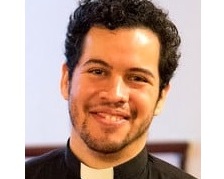A new meditation from Fr. Javier in the Hope for the Journey series. You can view the complete series here and join the discussion on Facebook.
Splitting an Order
by Ted Koozer
I like to watch an old man cutting a sandwich in half,
maybe an ordinary cold roast beef on whole wheat bread,
no pickles or onion, keeping his shaky hands steady
by placing his forearms firm on the edge of the table
and using both hands, the left to hold the sandwich in place,
and the right to cut it surely, corner to corner,
observing his progress through glasses that moments before
he wiped with his napkin, and then to see him lift half
onto the extra plate that he had asked the server to bring,
and then to wait, offering the plate to his wife
while she slowly unrolls her napkin and places her spoon,
her knife and her fork in their proper places,
then smoothes the starched white napkin over her knees
and meets his eyes and holds out both old hands to him.
Once, early on in college, I attended a Mennonite congregation for the first time. I hadn’t wandered far from my religious upbringing at that point, so I was used to a certain way of doing church—communion included.
In the churches I attended growing up, communion took place somewhere in the middle of the service. It usually involved a short talk on the meaning of the Lord’s Supper, and it was followed by passing a plate around with the elements: small, chalky tabs of bread and plastic shot glasses of grape juice. If you were baptized, you grabbed one of each, observed a moment of silent prayer, and consumed them right then and there. The service then moved on to the sermon.
It didn’t take place that way during my first Mennonite service. At the appointed time, we were asked to walk to the front of the church for communion, much like we do in a traditional Episcopal service. Unlike our way of doing things, however, the person serving communion held a round loaf of bread in her hands. She ripped off a generous helping and placed it on my open palm, which I then dipped in a cup of wine. For fear of appearing to “chew” on the Body of Christ, I decided to gulp the bread down as quickly as I could.
I nearly choked on it on the way back to my seat.
It was the most delicious communion bread I have ever tasted.
Christians throughout the centuries have practiced the Lord’s Supper in a variety of ways, and this season apart is also forcing us to adapt. At St. Paul’s, we have chosen to continue celebrating the Eucharist on Sunday while the service is livestreamed. Other Episcopal churches have chosen to say Morning Prayer instead.
In light of our current moment, I would like to invite you to reflect on two different, but related, matters. First, the Eucharist service in The Book of Common Prayer is appropriately subtitled “The Liturgy of the Proclamation of the Word of God and Celebration of the Holy Communion” (315). Christ is present to us in Word and Sacrament—not one more so than the other, but in both. Much like receiving communion in one kind signifies full participation in the Holy Meal, therefore, I wonder if this time provides us with an opportunity to remember that Christ isn’t bound to bread and wine alone—that Jesus is also present to us in the proclamation of the Word, even if we find ourselves homebound.
The second point has to do with what absence teaches us. Our virtual gatherings have provided us with a wonderful way to remain connected, and yet I’m afraid—as others have already pointed out—that leaning too eagerly on virtual connection prevents us from properly grieving what we’ve lost. In a strange way, then, our inability to take communion on Sunday may give us much-needed room to acknowledge the pain of being apart.
To grieve that loss, however, also helps us name what we desire more clearly. Much like Fr. George said recently, I don’t simply want to go back to business-as-usual once this is over: I long for a gathering that more perfectly reflects God’s dream for us. I want to gather with that holy multitude drawn from every tongue, tribe, and nation—a vision that may escape our grasp but compels us ever forward.
We will gather again: somehow, some way. And there are others that we are called to welcome at the Table. Others we have yet to meet.
Longing for that gathering reminds me that I’ve yet to taste the best communion bread. That, my friends, is good news indeed.
— Fr. Javier


For more parish resources and updates during the global pandemic, visit St. Paul’s Connects.

